四年级新年英语手抄报
五年级上册关于2024年春节的英语小报

五年级上册关于2024年春节的英语小报The Spring Festival, or Lunar New Year, is the most celebrated holiday in China and among Chinese communities around the world. Marking the end of winter and the beginning of the spring season, the festival is a time for family reunions, feasting, and giving thanks. In 2024, the Spring Festival fell on February 10th, initiating the Year of the Dragon, a symbol of strength, fortune, and good luck in Chinese culture.As the new moon appeared in the sky, families gathered to share a meal known as the reunion dinner, featuring dishes like dumplings, which signify wealth due to their shape resembling ancient Chinese money, and fish, to represent abundance. Homes were adorned with red decorations, lanterns, and couplets bearing poetic wishes for prosperity, happiness, and longevity.Children, dressed in new clothes to symbolize a fresh start, eagerly anticipated the red envelopes, or 'hongbao', filled with money, given by elders as tokens of good fortune. The air buzzed with excitement and the loud cracks of fireworks and firecrackers, believed to scare away evil spirits and attract the benevolent ones.Community celebrations included dragon and lion dances, where performers, cloaked in elaborate costumes, moved to the rhythm of drums and cymbals, bringing the mythical creatures to life in a vibrant display of color and sound. These performances are not only a spectacle but also a ritual to usher in good luck and dispel any lingering negativity.The festival is also a time for honoring deities and ancestors. Many families visit temples to pray for a blessed year ahead. Incense sticks burn steadily, filling the air with a fragrant smoke that carries the hopes and wishes of the devotees to the heavens.In schools, children learn about the traditions and stories associated with the Spring Festival. They engage in activities like crafting paper lanterns, writing calligraphy, and learning folk songs that reflect the joyous spirit of the occasion. These educational experiences ensure that the rich cultural heritage is passed down to the next generation.The Spring Festival concludes with the Lantern Festival, which takes place on the fifteenth day of the first lunar month. People stroll through streets lined with lanterns of all sizes and shapes, solving riddles written on them, a tradition that dates back over a thousand years. The night sky is illuminated by the glow of lanterns, symbolizing the letting go of the past and the welcoming of a brighter future.The Spring Festival of 2024 was a testament to the enduring nature of these traditions, even as the world changes around us. It's a time when the past and present merge, creating a bridge to the future, grounded in the values of family, gratitude, and hope. As the festivities draw to a close, the spirit of the Spring Festival lingers, reminding us of the continuous cycle of seasons and the promise of renewal that each new year brings.。
春节手抄报用上四年级上册英语一二单元的内容

春节手抄报用上四年级上册英语一二单元的内容全文共3篇示例,供读者参考篇1Chinese New Year Handwritten ReportHello everyone! My name is Xiaoming and I'm a 4th grader. For our Chinese New Year handwritten report this year, I decided to use some content from the first two units we covered in our English textbook. I thought it would be a fun way to review what we learned and also share some traditions around this important holiday.In Unit 1, we started by learning how to greet each other and introduce ourselves in English. Some of the phrases we practiced were "Hello, I'm..." and "Nice to meet you." We also learned the question "How are you?" and responses like "I'm good, thanks" or "Not bad." These are really useful for starting conversations.Another key part of Unit 1 was learning words for different family members like mom, dad, brother, sister, etc. This ties in well with Chinese New Year since it's such a big family holiday! We get together with grandparents, aunts, uncles, and cousins. It's a special time to catch up.In Unit 2, we moved on to talking about ages and birthdays. We practiced saying "I'm __ years old" and asking "How old are you?" At New Year, it's traditional for kids to get red envelopes with money from their elders. The older you are, the more money you might get! We also learned to say months like January, February and dates like the 1st, 15th, etc. Chinese New Year falls sometime between late January and mid-February based on the lunar calendar.Another important part of Unit 2 was learning words for different hobbies and sports. Some of the ones we covered were reading, swimming, playing soccer/basketball/video games, and more. During the New Year holiday break, we get two whole weeks off from school! That gives us plenty of time to relax and enjoy our hobbies.My personal favorites are reading Chinese myth stories and playing basketball with my cousin Liang. We'll probably get together and play a few games during the holiday. I'll have to be sure to use some English while we play, like "Nice shot!" or "Your turn" or "That was out of bounds."Of course, no Chinese New Year would be complete without the tradition of setting off firecrackers! We learned the word "fireworks" in Unit 2. They are supposed to scare away any evilspirits and bring good luck for the coming year. My grandpa always gets a huge bundle of firecrackers for us to light. It's my job to carefully collect all the red papers after they've gone off.Another New Year tradition is giving treats like candies, chocolates, and cookies. We learned how to say the names of different sweets in English like "chocolate", "candy", and "cookie." Every year, my uncle's family brings boxes of delicious New Year's candies and snacks. My favorite is the boxes with chocolate coins wrapped in red and gold foil. They're supposed to bring prosperity in the coming year.Finally, no Chinese New Year would be complete without the colored red envelopes I mentioned before. We give out red envelopes containing cash to kids, servers at restaurants, and sometimes employees to wish them luck and prosperity. The tradition comes from an ancient myth about a monster that was scared away by the loud sounds of fireworks and the bright red color. Ever since then, red has been considered extremely lucky for New Year.Inside each envelope, you'll find crisp new bills. In English, we can say things like "a 10 bill" or "a 20 bill" followed by the word "note" after the dollar amount like "10 note." Kids always get so excited running around showing off their red envelopesfull of cash! I have to be careful not to lose any of my envelopes or spend the money too quickly though.Well, that's my overview of some key English vocabulary and phrases from Units 1 and 2 that relate to Chinese New Year. I hope you enjoyed reading about how I'll be using my English skills over the holiday break. Studying English is difficult, but fun traditions like New Year make it more enjoyable to practice. I'm looking forward to two weeks of family, feasting, fun, and practicing my English!Wishing everyone a happy, healthy, and prosperous New Year! Study hard, play hard, and have an amaaaaaazing break!篇2A Handwritten Spring Festival NewsletterThe Spring Festival holiday is approaching, and our English teacher has given us a special assignment - to create handwritten newsletters using vocabulary and dialogues from Units 1 and 2 of our textbooks. I'm really excited about this project because it combines my love for English with traditional Chinese culture and arts.In Unit 1, we learned about introductions, greetings, and talking about our families. I can include a section introducingmyself, my family members, and our hometown. It will be fun to write a dialogue between me and one of my fictional classmates, where we exchange basic greetings and ask each other questions like "What's your name?", "Where are you from?", and "How old are you?". I've practiced these conversations many times, so putting them in my newsletter will help reinforce what I've learned.Another part of Unit 1 covered describing people's appearances and personalities. I could make portraits of my family members and describe them using words like "tall", "short", "friendly", "quiet", etc. Drawing is one of my favorite hobbies, so I'm looking forward to this artistic aspect of the project.Moving on to Unit 2, we studied vocabulary related to sports, hobbies, and the classroom. I'm planning to draw some scenes of myself and my friends playing sports like badminton or basketball. We can include speech bubbles with phrases like "Let's play tennis" and "I'm good at ping-pong." There are so many fun classroom expressions I can incorporate too, such as "May I use the restroom?", "I don't understand", and "Please speak more slowly."One idea I had was to make the newsletter in the form of a comic book, with different panels showing me doing various activities and interacting with friends and teachers. The great thing about comics is that they combine text, images, and dialogue in a really engaging way. As long as I stick to the vocabulary from Units 1 and 2, I can get pretty creative with the storyline and visuals.Of course, no Spring Festival project would be complete without some cultural elements. I'll likely include traditional symbols and decorations like lanterns, firecrackers, the word "fu" (which means good fortune), and maybe even depictions of the mythical beast Nian which the festival is meant to drive away. Adding these touches will give my newsletter an authentic Chinese New Year flavor.An additional challenge will be making sure my handwriting is neat and legible. Our teacher emphasized that this project is meant to celebrate the art of handwriting and calligraphy. I may ask my grandparents for some tips, since their calligraphy skills are excellent. Even if my writing isn't perfect, putting in my best effort will show how much I value this tradition.I can't wait to get started on this Spring Festival newsletter! It's the perfect way to review what I've learned so far in Englishclass while getting into the holiday spirit. My mom already said she would help me bind the pages together with a nice red string or ribbon. Once it's all assembled, I'll proudly put my newsletter on display for visitors to read during our New Year's celebrations. Making this handwritten project will be a memorable experience and an opportunity to have fun with the English language.篇3A Spring Festival Handwritten NewsletterHi friends! The Spring Festival holiday is coming up and our teacher asked us to make handwritten newsletters about our lives using what we've learned in English class so far this year. I'm really excited to share my newsletter with you all!First, let me introduce myself. My name is Li Ming and I'm a 4th grade student at Sunshine Elementary School. I live with my mom, dad, younger brother and grandparents in a big apartment building in the city. Our family is really close and we love spending time together, especially during the Spring Festival holiday.Every year, we decorate our home with traditional red lanterns, spring couplets and paper cuts. My favorite part is making dumplings together on New Year's Eve while watchingthe Spring Festival Gala on TV. Then at midnight, we set off firecrackers and fireworks in the courtyard to welcome the New Year. It's so exciting!On the first day of the New Year, we have a special family reunion dinner. The table is filled with all my favorite dishes like sweet and sour pork, kung pao chicken, steamed fish and hot pot.I always eat way too much! After dinner, the adults give out red envelopes with lucky money inside for the kids. My little brother and I look forward to this all year.The following days are spent visiting relatives, watching movies, playing games and enjoying the company of family. My grandparents love telling stories about traditions and their childhood Spring Festivals. I enjoy listening, even though I don't understand everything they say in the local dialect.One special tradition in our family is making sugar blossoms on the 15th day of the New Year, which is the Lantern Festival. Sugar blossoms are made by melting sugar into different flower shapes using a special tool. They are delicate, beautiful and so much fun to make and eat!That's a little glimpse into how I celebrate Spring Festival. Now let me tell you about what I've learned in my English classUnits 1 and 2. I'll share some of the vocabulary, grammar points and conversation topics we covered.In Unit 1, we learned how to introduce ourselves and share basic information like name, age, grade, family members, pets, hobbies and more. Some useful phrases are:"Hi, I'm...""I'm ... years old.""I'm in __ grade.""I have __ siblings.""My favorite hobby is..."We also practiced asking and answering simple questions using this vocabulary, like:"How old are you?""What grade are you in?""Do you have any pets?""What are your hobbies?"In addition to introductions, Unit 1 covered talking about daily routines and schedules. We learned vocabulary for common activities like:Wake upGet dressedEat breakfast/lunch/dinnerGo to schoolDo homeworkPlay sports/gamesRead booksWatch TVGo to bedAnd we put these into sentences like:"I wake up at 7am every day.""After school, I play soccer with my friends.""Before bed, I read books for 30 minutes."Doesn't that sound like a nice daily routine? Writing about my typical day in class made me appreciate all the little things I do regularly.Moving on to Unit 2, the main topics were describing people's personalities and appearances. We learned adjectives to describe someone's character like:Funny/seriousOutgoing/shyPatient/impatientKind/meanHard-working/lazyAnd for physical descriptions:Tall/shortThin/fatYoung/oldHave long/short hairWear glassesThen we practiced making descriptive sentences such as:"My best friend is very funny and outgoing.""The teacher is kind but sometimes impatient.""My little brother is short with curly brown hair."Doesn't it make you want to describe your own family and friends? This unit helped me see people's inner and outer qualities in a new way.Well, that's a taste of Units 1 and 2 from my English textbook. Hopefully I gave you a window into my Spring Festival celebrations and some of the language I'm learning this year. Writing this newsletter combined my life experiences with my studies in a fun way. I'm so glad I could share it with you all!Before I go, let me wish everyone a Happy Spring Festival! May the coming year be filled with happiness, good health and prosperity. Thanks for reading my newsletter. I'll leave you with one last phrase we learned:"See you next time!"。
英语春节手抄报内容整理
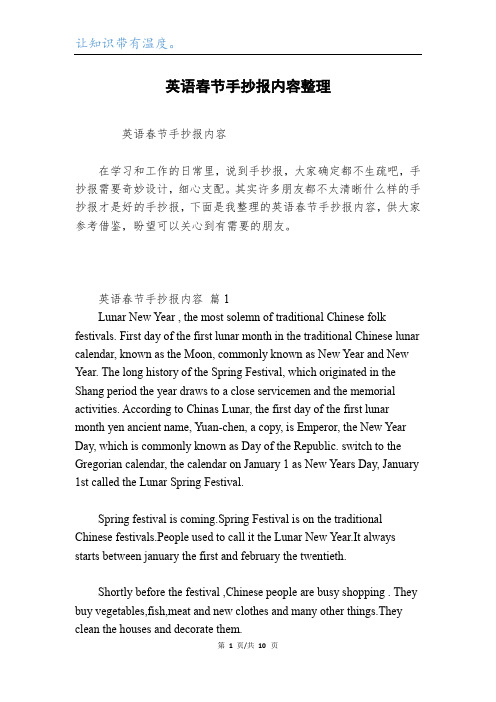
英语春节手抄报内容整理英语春节手抄报内容在学习和工作的日常里,说到手抄报,大家确定都不生疏吧,手抄报需要奇妙设计,细心支配。
其实许多朋友都不太清晰什么样的手抄报才是好的手抄报,下面是我整理的英语春节手抄报内容,供大家参考借鉴,盼望可以关心到有需要的朋友。
英语春节手抄报内容篇1Lunar New Year , the most solemn of traditional Chinese folk festivals. First day of the first lunar month in the traditional Chinese lunar calendar, known as the Moon, commonly known as New Year and New Year. The long history of the Spring Festival, which originated in the Shang period the year draws to a close servicemen and the memorial activities. According to Chinas Lunar, the first day of the first lunar month yen ancient name, Yuan-chen, a copy, is Emperor, the New Year Day, which is commonly known as Day of the Republic. switch to the Gregorian calendar, the calendar on January 1 as New Years Day, January 1st called the Lunar Spring Festival.Spring festival is coming.Spring Festival is on the traditional Chinese festivals.People used to call it the Lunar New Year.It always starts between january the first and february the twentieth.Shortly before the festival ,Chinese people are busy shopping . They buy vegetables,fish,meat and new clothes and many other things.They clean the houses and decorate them.英语春节手抄报内容篇21、Good luck, good health, hood cheer. I wish you a happy New Year.祝好运、健康、佳肴伴你度过一个欢乐新年。
英语春节手抄报的内容

春节的手抄报内容英语春节的手抄报内容英语篇1Spring Festival is a traditional festival in China and some Asian nations. Because legend has it that the beast is afraid of red, afraid of fire and afraid of sound, so people will have couplets, firecrackers, gongs and drums and other customs. Different periods, different regions, different ethnic customs are not the same.春节是中国及一些亚洲民族一个古老的传统节日。
因为相传年兽怕红色,怕火光和怕响声,所以人们便有贴春联、放鞭炮、敲锣打鼓等习俗。
不同时期、不同地区、不同民族的习俗都不相同。
In China, the Spring Festival is also a minority national people's customs and festivals. People of all ethnic groups in accordance with their own customs, held a variety of celebration, with their strong national unique style. Spring Festival is an ancient festival in China. It is also one of the most important festival in the whole year. How to celebrate this festival, in the history of thousands of years, has formed some relatively fixed customs, there are still many people who have been handed down.在中国,春节也是少数民族人民的风俗节日。
小学节日主题中英语手抄报内容范文

小学节日主题中英语手抄报内容范文一、春节(Spring Festival)春节是中国最重要的传统节日,通常在农历正月初一庆祝。
以下是一些关于春节的英语手抄报内容:1、节日介绍The Spring Festival, also known as Chinese New Year, is the most significant festival in China It marks the beginning of a new lunar year and is a time for family reunions, feasts, and various traditional activities2、传统习俗People clean their houses thoroughly before the festival to sweep away bad luck They decorate their homes with red couplets, red lanterns, and colorful New Year pictures On New Year's Eve, families have a big dinner together, featuring dishes such as dumplings, fish, and chicken After dinner, they stay up late to welcome the new year and set off firecrackers to drive away evil spirits3、新年祝福Happy New Year! May all your dreams come true in the year of the Rabbit Good luck and prosperity in the new year! Wishing you a happy and healthy life4、春节传说There is a legend about a monster called "Nian" who would come out to harm people on New Year's Eve But people found that Nian was afraid of the color red and loud noises So they started to use red decorations and set off firecrackers to scare Nian away二、元宵节(Lantern Festival)The Lantern Festival falls on the 15th day of the first lunar month It is a celebration of the end of the Spring Festival1、节日特色People enjoy viewing various kinds of lanterns in the streets and parks The lanterns come in different shapes and colors, such as animals, flowers, and figures from Chinese myths and legends2、传统美食Sweet dumplings are a popular food during the Lantern Festival They are made of glutinous rice flour and filled with sweet fillings like sesame, peanut, or red bean paste3、活动There are also lion and dragon dances, riddle guessing games, and fireworks displays Riddle guessing is very interesting People write riddles on lanterns and others try to solve them4、意义The Lantern Festival symbolizes family unity and happiness It is a time for people to have fun and enjoy the last moments of the Spring Festival三、清明节(TombSweeping Day)TombSweeping Day, also known as Qingming Festival, usually falls around April 4th or 5th in the solar calendar1、节日目的It is a day for people to remember and honor their ancestors by visiting their graves, cleaning the tombs, and offering sacrifices2、传统活动People also fly kites, plant trees, and enjoy the spring scenery Some families have a picnic near the graves to spend time together3、诗句"清明时节雨纷纷,路上行人欲断魂。
英语关于新年决心的手抄报
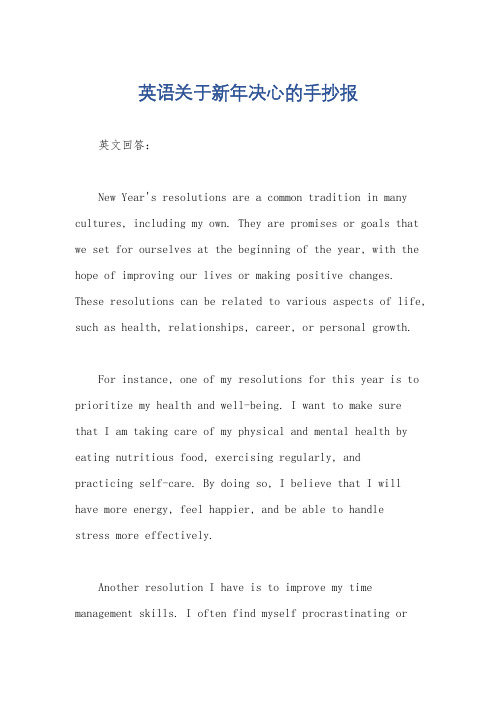
英语关于新年决心的手抄报英文回答:New Year's resolutions are a common tradition in many cultures, including my own. They are promises or goals that we set for ourselves at the beginning of the year, with the hope of improving our lives or making positive changes. These resolutions can be related to various aspects of life, such as health, relationships, career, or personal growth.For instance, one of my resolutions for this year is to prioritize my health and well-being. I want to make surethat I am taking care of my physical and mental health by eating nutritious food, exercising regularly, andpracticing self-care. By doing so, I believe that I will have more energy, feel happier, and be able to handlestress more effectively.Another resolution I have is to improve my time management skills. I often find myself procrastinating orgetting easily distracted, which leads to inefficiency and unnecessary stress. To address this, I plan to create adaily schedule and stick to it, set realistic deadlines for tasks, and eliminate distractions as much as possible. By managing my time more effectively, I hope to be more productive and achieve my goals more efficiently.In addition, I want to strengthen my relationships with my loved ones. Sometimes, due to the demands of everyday life, I neglect to spend quality time with my family and friends. Therefore, one of my resolutions is to make a conscious effort to connect with them on a regular basis. This can be through phone calls, video chats, or even planning outings together. By nurturing these relationships, I believe that I will feel more supported and connected, which will contribute to my overall happiness and well-being.Furthermore, I aim to expand my knowledge and skillsthis year. Learning is a lifelong process, and I believethat acquiring new knowledge and skills can open doors to new opportunities and personal growth. I plan to read morebooks, take online courses, and attend workshops orseminars related to my interests. By continuously learning and challenging myself, I hope to broaden my horizons and become a more well-rounded individual.Overall, these resolutions reflect my desire to lead a healthier, more fulfilling, and balanced life. By setting these goals and taking small steps towards achieving them,I believe that I can make positive changes and create a better version of myself in the coming year.中文回答:新年决心是许多文化中的一个传统,包括我自己的文化。
新年快乐英语手抄报
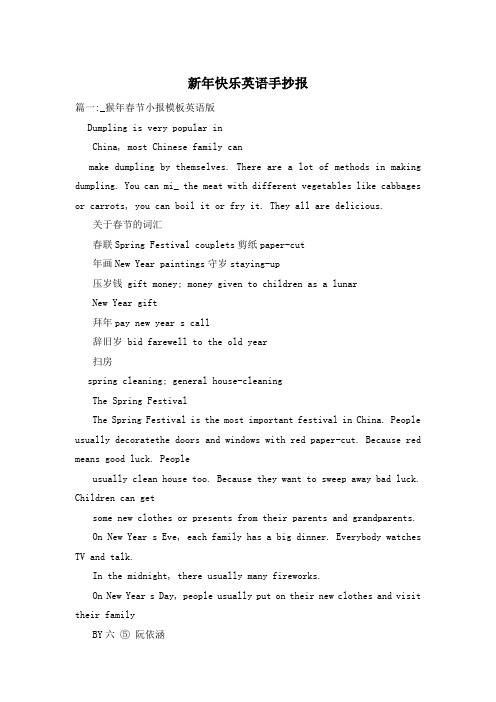
新年快乐英语手抄报篇一:_猴年春节小报模板英语版Dumpling is very popular inChina, most Chinese family canmake dumpling by themselves. There are a lot of methods in making dumpling. You can mi_ the meat with different vegetables like cabbages or carrots, you can boil it or fry it. They all are delicious.关于春节的词汇春联Spring Festival couplets剪纸paper-cut年画New Year paintings守岁staying-up压岁钱 gift money; money given to children as a lunarNew Year gift拜年pay new year s call辞旧岁 bid farewell to the old year扫房spring cleaning; general house-cleaningThe Spring FestivalThe Spring Festival is the most important festival in China. People usually decoratethe doors and windows with red paper-cut. Because red means good luck. Peopleusually clean house too. Because they want to sweep away bad luck. Children can getsome new clothes or presents from their parents and grandparents. On New Year s Eve, each family has a big dinner. Everybody watches TV and talk.In the midnight, there usually many fireworks.On New Year s Day, people usually put on their new clothes and visit their familyBY六⑤ 阮依涵and friends. They usually say: Happy New Year.The Spring Festival finishes at the Lantern Festival after two weeks. People usually eat a kind of rice dumpling called Yuan _iao. It can take people good luck all the year round.好词好句:Thank you for your hard work and patience on this holiday season.值此佳节,谨对您的辛勤栽培表示感谢.Wish you and your family a very happy new year. 祝福您及全家新年快乐.A New Year greeting to cheer you, my good friend. 希望新年祝福给你带来欢乐,我的好朋友. Best of luck in the year to come. 愿你在未来的一年里,吉星高照. Wish all the best wishes for you. 献上最美好的祝愿.篇二:Happy New Year1_0A3元旦新年外语电子小报成品,欢度元旦手抄报模板元旦快乐英语板报画报模板电脑手抄报班级:瑞丽图文制作中心姓名:请把这串文字改成班级姓名,把文件下载到电脑中,在这串文字上面用键盘直接输入班级姓名.Good luck, good health, hood cheer. I wishyou a happy New Year. 祝好运.健康.佳肴伴你度过一个快乐新年.With best wishes for a happy New Year! 祝新年快乐,并致以良好的祝福.I hope you have a most happy and prosperous New Year.谨祝新年快乐幸福,大吉大利.In contemporary, New Year s day, refers to the Christian era at the first day. Since the western introduced into China, New Year s day after a word was dedicated to the New Year, the traditional JiuLiNian says the Spring Festival在当代,元旦指公元纪年的岁首第一天.自西历传入我国以后,元旦一词便专用于新年,传统的旧历年则称春节.CHEER THE YEAR (欢乐年)Cheer, cheer, cheer the year,(欢乐,欢乐年)A new one s just begun.(新的一年开始了) Celebrate with all your friends, (和你所有的朋友一起庆祝)Let s go have some fun! (让我们一起去开心) Clap, clap, clap your hands.(拍,拍,拍拍你的手)篇三:The chinese new year新年英语报_5A4新年春节英语电子小报欢度春节外语手抄报新年快乐双语简报板报模板班级:瑞丽图文制作中心姓名:请把这串文字改成班级姓名,把文件下载到电脑中,The Spring Festival is the most important festival in China.People usually decorate the doors and windows with red papercuts.becouse red means good luck.People usually clean house too.becouse they want to sweep away bad luck.Children can get some new clothes or presents from their parents and grandparents.On New Year s Eve, family always have a big dinner.Everybody are watch TV and talk.In the midnight, there usually fairworks.On New Year s Day, people usually put on their new clothes and visit their femily and friends.They usually say: Happy New Year s Day.。
中小学生春节新年寒假英语外语英文小报新年好快乐A3横排电子小报手抄报可编辑模板
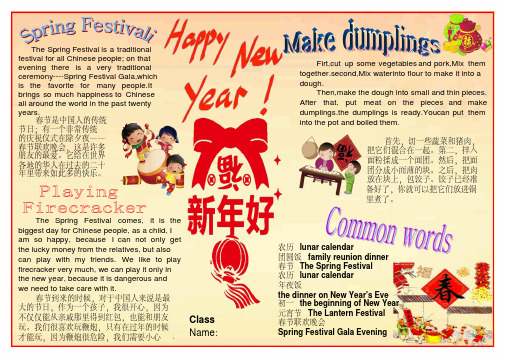
The Spring Festival is a traditionalfestival for all Chinese people; on that evening there is a very traditional ceremony----Spring Festival Gala,whichis the favorite for many people.Itbrings so much happiness to Chineseall around the world in the past twenty years.春节是中国人的传统节日;有一个非常传统的庆祝仪式在除夕夜——春节联欢晚会,这是许多朋友的最爱。
它给在世界各地的华人在过去的二十年里带来如此多的快乐。
The Spring Festival comes, it is the biggest day for Chinese people, as a child, I am so happy, because I can not only get the lucky money from the relatives, but also can play with my friends. We like to play firecracker very much, we can play it only in the new year, because it is dangerous andwe need to take care with it.春节到来的时候,对于中国人来说是最大的节日,作为一个孩子,我很开心,因为不仅仅能从亲戚那里得到红包,也能和朋友玩。
我们很喜欢玩鞭炮,只有在过年的时候才能玩,因为鞭炮很危险,我们需要小心。
Firt,cut up some vegetables and pork,Mix themtogether.second,Mix waterinto flour to make it into adough.Then,make the dough into small and thin pieces.After that, put meat on the pieces and makedumplings.the dumplings is ready.You c an put theminto the pot and boiled them.首先,切一些蔬菜和猪肉,把它们混合在一起。
新年英语手抄报内容及图片
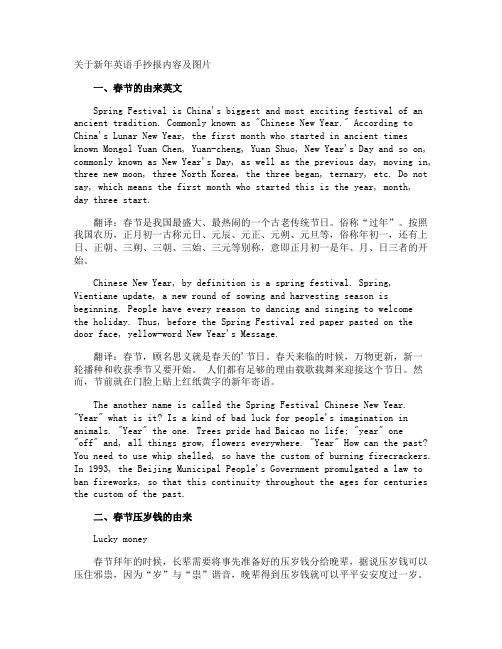
关于新年英语手抄报内容及图片一、春节的由来英文Spring Festival is China's biggest and most exciting festival of an ancient tradition. Commonly known as "Chinese New Year." According to China's Lunar New Year, the first month who started in ancient times known Mongol Yuan Chen, Yuan-cheng, Yuan Shuo, New Year's Day and so on, commonly known as New Year's Day, as well as the previous day, moving in, three new moon, three North Korea, the three began, ternary, etc. Do not say, which means the first month who started this is the year, month,day three start.翻译:春节是我国最盛大、最热闹的一个古老传统节日。
俗称“过年”。
按照我国农历,正月初一古称元日、元辰、元正、元朔、元旦等,俗称年初一,还有上日、正朝、三朔、三朝、三始、三元等别称,意即正月初一是年、月、日三者的开始。
Chinese New Year, by definition is a spring festival. Spring, Vientiane update, a new round of sowing and harvesting season is beginning. People have every reason to dancing and singing to welcomethe holiday. Thus, before the Spring Festival red paper pasted on the door face, yellow-word New Year's Message.翻译:春节,顾名思义就是春天的'节日。
春节英语小报内容
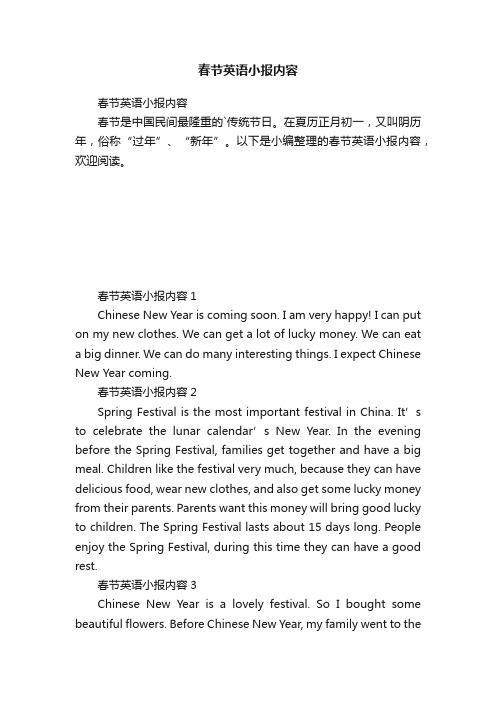
春节英语小报内容春节英语小报内容春节是中国民间最隆重的`传统节日。
在夏历正月初一,又叫阴历年,俗称“过年”、“新年”。
以下是小编整理的春节英语小报内容,欢迎阅读。
春节英语小报内容1Chinese New Year is coming soon. I am very happy! I can put on my new clothes. We can get a lot of lucky money. We can eat a big dinner. We can do many interesting things. I expect Chinese New Year coming.春节英语小报内容2Spring Festival is the most important festival in China. It’s to celebrate the lunar calendar’s New Year. In the evening before the Spring Festival, families get together and have a big meal. Children like the festival very much, because they can have delicious food, wear new clothes, and also get some lucky money from their parents. Parents want this money will bring good lucky to children. The Spring Festival lasts about 15 days long. People enjoy the Spring Festival, during this time they can have a good rest.春节英语小报内容3Chinese New Year is a lovely festival. So I bought some beautiful flowers. Before Chinese New Year, my family went to theshopping mall and bought a lot of things. There will be a big dinner for every family. My family eats the big dinner together. I was very happy in Chinese New Year.春节英语小报内容4The first day of the first lunar month is the Spring Festival, also known as the lunar calendar year, commonly known as "the New Year". This is one of the most solemn and lively traditional festivals in our country.Spring Festival is the most important festival of the han nationality. However, our country is a multi-ethnic country, besides han nationality, and full, Mongolia, yao, zhuang, white, mountains, hezhen, hani, daur, dong, li and so on more than a dozen ethnic minorities have the custom of Spring Festival.The Spring Festival has a long history. It originated from the worship of god at the end of the shang dynasty. There are also many legends about the year. The ancient Chinese New Year is called "yuan day", "New Year's day" and "New Year". After the revolution of 1911, the first lunar month was officially called Spring Festival.The long history of the years makes the content of the vulgar activities colorful. Among them, those who worship god day offering superstition, has gradually been eliminated, and the rich content of the life interest, like to stick couplets on the Spring Festival, post pictures, stick to "f" word, cut grilles, steamed rice cakes, dumplings, burning fireworks, New Year's eve vigil, such as New Year customs are still very popular.The earliest spring couplet in China was written by meng chang on the peach board in the five dynasties period: "New Year na yuqing, jiarun chang changchun".Writing the Spring Festival in red paper begins in the Mingdynasty. The painting originated from the tang dynasty god, which, like firecrackers, was used to exorcise evil spirits in ancient times, but now it has become a custom for increasing the festive atmosphere. The word "fu" was written before the song dynasty. People wrote the word "fu" on red square paper and deliberately put it on the door, window and furniture, and took it as the meaning of "blessing to fall".New Year's eve is the most important custom of the year, which was recorded in the wei and jin dynasties. On New Year's eve, to spend the evening with the family, to celebrate the year, to gather and drink, to share the happiness of the family, this is the annual custom that the Chinese people still pay great attention to. After the first rooster crowing, the New Year begins, both men and women of old and young are dressed for the festival, first to celebrate the elderly in the family, and then to the friends, to congratulate each other. From the first to the fifteenth, people have been immersed in the festive atmosphere of happiness, peace and civilization.。
英语春节手抄报内容带翻译

英语春节手抄报内容带翻译IntroductionThe Spring Festival, also known as Chinese New Year, is the most important traditional festival in China. It marks the beginning of the lunar calendar year and is celebrated by Chinese people all over the world. In this article, we will explore the customs and traditions of the Spring Festival and provide a brief translation in English.1. Origin and SignificanceThe Spring Festival has a long history, dating back over 4,000 years. It originated as a way to ward off evil spirits and pray for a good harvest. Today, it is a time for family reunions and a chance to wish for a prosperous and auspicious year ahead.(起源和意义)春节有着悠久的历史,可以追溯到4000多年前。
它起源于人们驱邪和祈祷丰收的方式。
如今,它是家庭团聚的时刻,也是一个希望来年繁荣和吉祥的机会。
2. PreparationsPreparations for the Spring Festival typically begin a couple of weeks before the actual holiday. Homes are thoroughly cleaned and decorated with red lanterns, couplets, and paper-cuts to create a festive atmosphere. People also buy new clothes and prepare special food, such as dumplings, fish, and rice cake.(准备工作)春节前的准备通常在实际假期的几周前开始。
春节手抄报英文内容
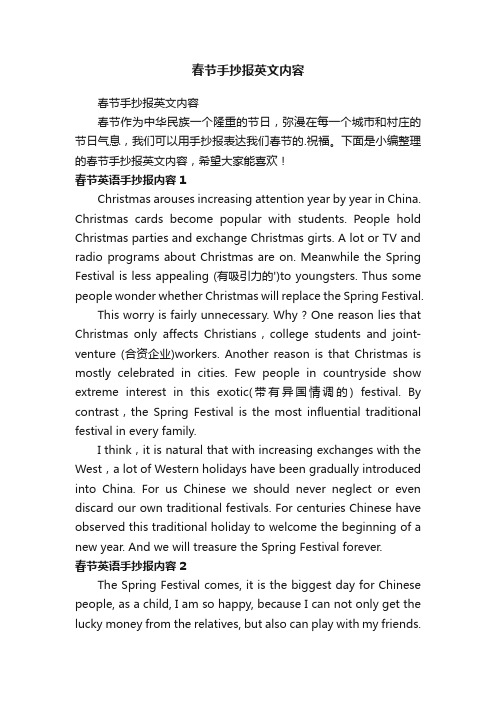
春节手抄报英文内容春节手抄报英文内容春节作为中华民族一个隆重的节日,弥漫在每一个城市和村庄的节日气息,我们可以用手抄报表达我们春节的.祝福。
下面是小编整理的春节手抄报英文内容,希望大家能喜欢!春节英语手抄报内容1Christmas arouses increasing attention year by year in China. Christmas cards become popular with students. People hold Christmas parties and exchange Christmas girts. A lot or TV and radio programs about Christmas are on. Meanwhile the Spring Festival is less appealing (有吸引力的')to youngsters. Thus some people wonder whether Christmas will replace the Spring Festival.This worry is fairly unnecessary. Why ? One reason lies that Christmas only affects Christians,college students and joint-venture (合资企业)workers. Another reason is that Christmas is mostly celebrated in cities. Few people in countryside show extreme interest in this exotic(带有异国情调的) festival. By contrast,the Spring Festival is the most influential traditional festival in every family.I think,it is natural that with increasing exchanges with the West,a lot of Western holidays have been gradually introduced into China. For us Chinese we should never neglect or even discard our own traditional festivals. For centuries Chinese have observed this traditional holiday to welcome the beginning of a new year. And we will treasure the Spring Festival forever.春节英语手抄报内容2The Spring Festival comes, it is the biggest day for Chinese people, as a child, I am so happy, because I can not only get the lucky money from the relatives, but also can play with my friends.We like to play firecracker very much, we can play it only in the new year, because it is dangerous and we need to take care with it.When I was in my hometown which is a small village, I could play firecracker anywhere, people would not blame me for playing the firecracker, but when I moved to the city, I found people less play it, if they want to play the firecracker, they need to stay away from the crowed. Indeed, it is necessary for people to play it in the remote zone, the firecracker will get exploded in a moment, so it will hurt the people.When we play the firecracker, we must learn to protect ourselves, too. Once the firecracker is lighted, we need to react quickly and drop it right now. As the firecracker will explode in two seconds, we also need to react in the short time.Playing firecracker brings people a lot of fun, but we need to take care.春节英语手抄报内容3Chinese New Year starts with the New Moon(新月)on the first day of the new year and ends on the full moon(满月)15 days later. The 15th day of the new year is called the Lantern Festival(元宵节), which is celebrated at night with lantern displays and children carrying lanterns in a parade.The Chinese calendar is based on a combination of lunar and solar movements. The lunar cycle(月运周期)is about 29.5 days. In order to "catch up" with the solar calendar the Chinese an extra month once every few years (seven years out of a 19-yearcycle). This is the same as adding an extra day on leap year (闰年). This is why, according to the solar calendar, the Chinese New Year falls on a different date each year.New Year's Eve and New Year's Day are celebrated as a familyaffair, a time of reunion and thanksgiving. The celebration was traditionally highlighted with a religious ceremony given in honor of Heaven and Earth(万物), the gods of the household and the family ancestors.The sacrifice to the ancestors, the most vital of all the rituals(仪式), united the living members with those who had passed away. Departed relatives are remembered with great respect because they were responsible for laying the foundations for the fortune and glory of the family.The presence of the ancestors is acknowledged on New Year's Eve with a dinner arranged for them at the family banquet table. The spirits of the ancestors, together with the living, celebrate the onset of the New Year as one great community. The communal feast called "surrounding the stove" or weilu. It symbolizes family unity and honors the past and present generations.。
英文春节手抄报祝福语内容简短 (20句)_国庆祝福语手抄报英文
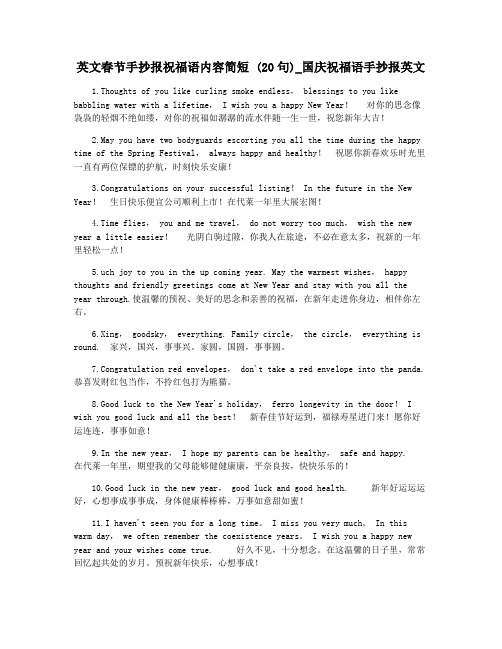
英文春节手抄报祝福语内容简短 (20句)_国庆祝福语手抄报英文1.Thoughts of you like curling smoke endless, blessings to you like babbling water with a lifetime, I wish you a happy New Year!对你的思念像袅袅的轻烟不绝如缕,对你的祝福如潺潺的流水伴随一生一世,祝您新年大吉!2.May you have two bodyguards escorting you all the time during the happy time of the Spring Festival, always happy and healthy!祝愿你新春欢乐时光里一直有两位保镖的护航,时刻快乐安康!3.Congratulations on your successful listing! In the future in the New Year!生日快乐便宜公司顺利上市!在代莱一年里大展宏图!4.Time flies, you and me travel, do not worry too much, wish the new year a little easier!光阴白驹过隙,你我人在旅途,不必在意太多,祝新的一年里轻松一点!5.uch joy to you in the up coming year. May the warmest wishes, happy thoughts and friendly greetings come at New Year and stay with you all theyear through.使温馨的预祝、美好的思念和亲善的祝福,在新年走进你身边,相伴你左右。
6.Xing, goodsky, everything. Family circle, the circle, everything is round. 家兴,国兴,事事兴。
小学四年级春节英语手抄报资料
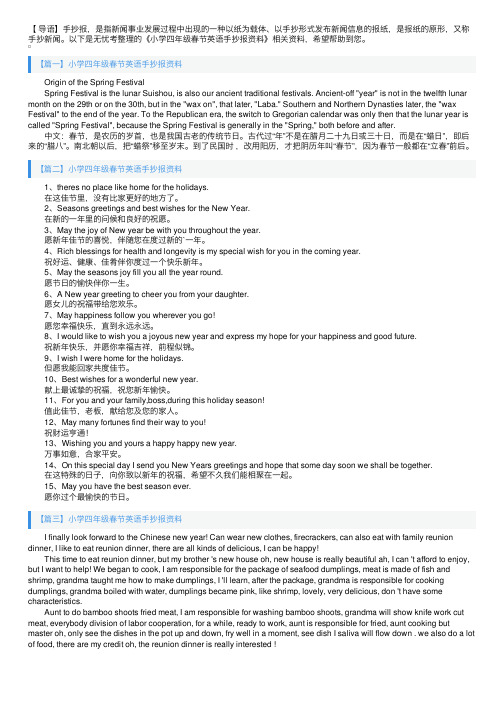
【导语】⼿抄报,是指新闻事业发展过程中出现的⼀种以纸为载体、以⼿抄形式发布新闻信息的报纸,是报纸的原形,⼜称⼿抄新闻。
以下是⽆忧考整理的《⼩学四年级春节英语⼿抄报资料》相关资料,希望帮助到您。
【篇⼀】⼩学四年级春节英语⼿抄报资料 Origin of the Spring Festival Spring Festival is the lunar Suishou, is also our ancient traditional festivals. Ancient-off "year" is not in the twelfth lunar month on the 29th or on the 30th, but in the "wax on", that later, "Laba." Southern and Northern Dynasties later, the "wax Festival" to the end of the year. To the Republican era, the switch to Gregorian calendar was only then that the lunar year is called "Spring Festival", because the Spring Festival is generally in the "Spring," both before and after. 中⽂:春节,是农历的岁⾸,也是我国古⽼的传统节⽇。
古代过“年”不是在腊⽉⼆⼗九⽇或三⼗⽇,⽽是在“蜡⽇”,即后来的“腊⼋”。
南北朝以后,把“蜡祭”移⾄岁末。
到了民国时,改⽤阳历,才把阴历年叫“春节”,因为春节⼀般都在“⽴春”前后。
【篇⼆】⼩学四年级春节英语⼿抄报资料 1、theres no place like home for the holidays. 在这佳节⾥,没有⽐家更好的地⽅了。
四年级上册译林版英语手抄报第一单元

四年级上册译林版英语手抄报第一单元Four-year-olds playfully explore the world, full of curiosity and excitement. As they embark on their educational journey, the first unit of the Grade 1 Yilin Press English textbook introduces young learners to the English language through engaging lessons and activities. In this report, we will delve into the key aspects of this unit.Unit One: Greetings and IntroductionsIn Unit One, students are introduced to simple English greetings and how to introduce themselves. The unit aims to create a welcoming environment where students can feel comfortable and confident in their ability to communicate in English.The unit begins with a warm-up activity, where students are encouraged to greet each other in English. By actively participating, students quickly familiarize themselves with the common English greetings, such as "Hello," "Good morning," and "How are you?"Next, students learn how to introduce themselves, including their names, ages, and nationalities. Through fun exercises like role-plays and group discussions, students gain practical experience in using these expressions in real-life situations.As the unit progresses, students engage in various activities that reinforce the learned material. They participate in oral drills, play interactive games, and complete worksheets, all designed to consolidate their understanding of greetings and introductions.Additionally, the unit incorporates multimedia elements, such as songs and videos, to enhance students' listening and speaking skills. These resources create an immersive learning experience where students can practice pronunciation, intonation, and word recognition.To assess students' progress, the unit concludes with a comprehensive evaluation. This evaluation tests students' ability to greet others and introduce themselves accurately. It also assesses their comprehension of the learned vocabulary and sentence structures.Throughout the unit, emphasis is placed on creating an inclusive and supportive classroom environment. Teachers are encouraged to provide ample opportunities for students to interact with their peers, fostering a sense of community and enhancing their language acquisition.Furthermore, the unit encourages the integration of technology into the learning process. Teachers are encouraged to utilize multimedia resources and interactive apps to engage and motivate students.In conclusion, the first unit of the Grade 1 Yilin Press English textbook is a vital foundation for young learners. By introducing basic greetings and self-introductions, students develop fundamental language skills and gain confidence in their ability to communicate in English. Through interactive activities, multimedia resources, and inclusive classroom practices, the unit provides an enriching learning experience for four-year-olds embarking on their English language journey.。
四年级英语上册手抄报

1、第一张四年Leabharlann 英语手抄报简单又漂亮2、第二张四年级英语手抄报下册
3、第三张四年级英语手抄报内容
4、第四张四年级英语手抄报图片大全一等奖
5、第五张四年级英语手抄报图片简单又漂亮
6、第六张四年级英语手抄报上册
7、第七张四年级英语手抄报模板图片
8、第八张四年级英语手抄报内容怎么写
9、第九张四年级英语手抄报上写什么
10、第十张四年级英语手抄报简单又漂亮大全
11、第十一张小学四年级英语手抄报简单又漂亮
- 1、下载文档前请自行甄别文档内容的完整性,平台不提供额外的编辑、内容补充、找答案等附加服务。
- 2、"仅部分预览"的文档,不可在线预览部分如存在完整性等问题,可反馈申请退款(可完整预览的文档不适用该条件!)。
- 3、如文档侵犯您的权益,请联系客服反馈,我们会尽快为您处理(人工客服工作时间:9:00-18:30)。
四年级新年英语手抄报
四年级新年英语手抄报
过年需要去拜年。
四年级新年英语手抄报有哪些?以下是小编为您整理的相关资料,欢迎阅读!
四年级新年英语手抄报:
四年级新年英语手抄报内容:新年作文
New Year in china is an important festival. Nearly everyone thinks highly of it. No matter where people go and no matter how far they go, they will try their best to go home enjoying family time. And no matter what difficulty or trouble they are experiencing, they will put aside for the period of time. In every house, the main atmosphere is happiness. What do people usually do during the New Year time? They will prepare a big meal together on New Year’s Eve. In the following days, they will visit their relatives. And their relatives also will pay a return visit. One of the most important things that they will not forget to do is to worship their ancestors. This is Chinese New Year.
在中国新年是一个很重要的节日。
几乎每个人都很重视。
不管人们在哪里,也不管他们去得有多远,他们都会尽量回家团聚。
无论他们正在经历着什么样的`困难或麻烦,他们都会暂时性的放下。
每家每户的主要氛围都是幸福。
在新年期间,人们通常都做些什么呢?他们会在除夕的晚上准备一顿大餐。
在接下来的几天里,他们就会去拜访亲戚。
他们的亲戚也会回访他们。
有一件他们不会忘记的重要事情是祭祀祖先。
这就是中国的新年。
【四年级新年英语手抄报】。
